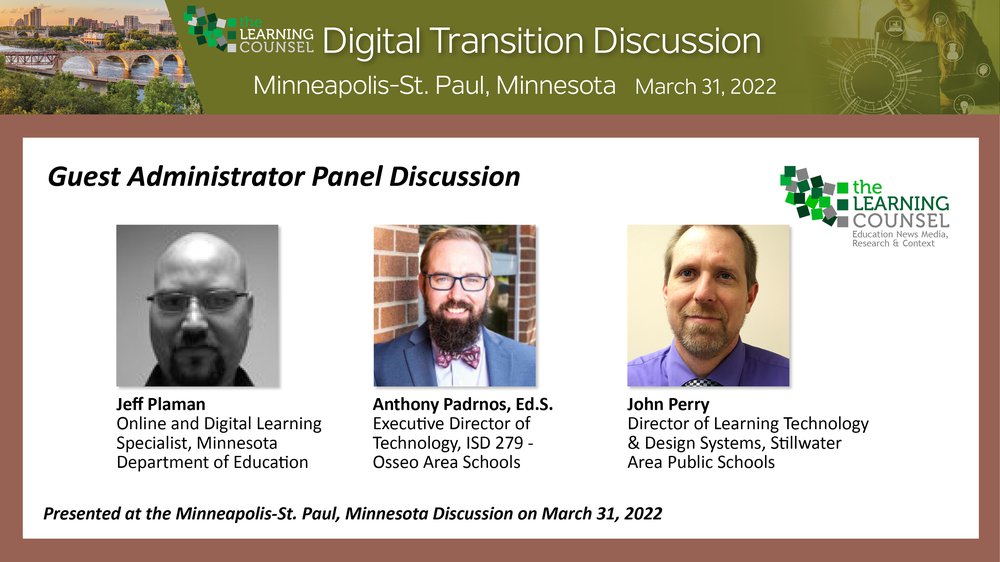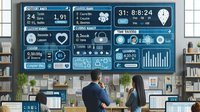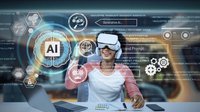Conference attendees love our Administrator Panel Discussions, which feature some of the top educational minds in the nation and are presented in an “everything goes” style, including plenty of new ideas and solutions – many of which attendees find useful in their own districts back home.
This panel discussion, which features Jeff Plaman, Online and Digital Learning Specialist at Minnesota Department of Instruction, Anthony Padrnos, Ed.S., Executive Director of Instruction at Osseo Area Schools, and John Perry, Director of Learning Technology and Design Systems at Stillwater Area Public Schools, is no exception.
According to John Perry, “The spot that we're in right now, post pandemic, is complicated. A lot of what has been talked about today in regard to the hybridization of education and the use of technology, must include the fact that there's a lot of trauma that's been felt from distance learning. We have large staffs of people that are ready to just go back to that safe place. The meeting students back into the classroom, our teachers now have 30 smiling faces in front of them. And then the questions of course come up. So, when do I develop these online lessons? How do I support hybrid learning? What do I do for the kids that aren't in front of me? You've got me for 185 days a year. And my daily calendar or my yearly calendar might not facilitate some of what we have learned, because that calendar during the pandemic was so different. And I hear about your online school and the flexibility you're building into that. But layering that now back onto our traditional system, that wants to go back to the way it was, is a huge challenge.”
Dr. Anthony Padrnos added, “I like the term complexity. It is a very complex situation we're in right now. As I spoke in my earlier segment about the teacher stress as well, or the trauma that's paired with the student trauma and the learning loss that we're trying to navigate. We had a lot of conversations at the beginning of the year about students being a year to two years behind socially and emotionally in just re-engaging with school and teachers, having to think about how do I just reteach the foundations and fundamentals of the school process? So, the range of what skills students brought into the classroom, not only social, emotional readiness to come back, but the academic skill set, has created to that complexity of trauma on teachers and what's being experienced with students as well.”
LeiLani Cauthen, group moderator and CEO of the Learning Counsel, brought the discussion into focus. “You're going to be caught in the headlights on this. But you know, we talked about the Uberization of learning and the disaggregation of the manufacturing line in pace. You have to maintain by age, hold up the kid who's too far ahead in math, because he's too far behind in language, double him on language, hold him up in math. These are the new constructs, and we call it hybrid logistics. But the new calendaring with algorithmic inference all the way into an Uber-like setting and auto triggering meetings based on cohorts with teachers is the new “new,” because we can't sacrifice human intersection and human teaching in the structural shift. And yet almost every state does online schools. Now every district has to have an online, and has said ‘well, I'll just go to the two modes. I'll have everybody in the building or they're online.’ And I would contend that's not good enough. I would contend there's a middle ground that's better. Because we know as educators, the human intersection can't go away, it has to be more efficient and precise.”
“So I agree,” said Jeff Plaman. “And I'm going to start to answer this question back from experience from the pandemic. I came in when Anthony (Padrnos) was doing his earlier segment and talking about ‘all of a sudden, we had students, with every student having an online experience.’ Right. And I think you layer on top of that, we all know that teachers, as John talked about for some of them, it was a traumatic experience. But I think the parents and the parent expectations have also changed. And when I think about those stakeholders together, the expectations are different now. Right? When I think about where we go from here, I think about how people's eyes have been opened to different ways of doing things. And I think that presents great opportunity. Now, the thing I think we have yet to figure out here is how to do this in a way that is equity-forward. Because inevitably, my main concern with more choice, more flexibility is that it's going to advantage folks who already have advantages.”
The panel continues with very thoughtful discussion, with nothing held back. Big ideas are discussed here, and big solutions are presented in response. You won’t want to miss a single moment of this very entertaining and enlightening Minnesota Administrators Panel Discussion.










